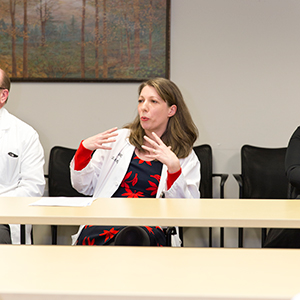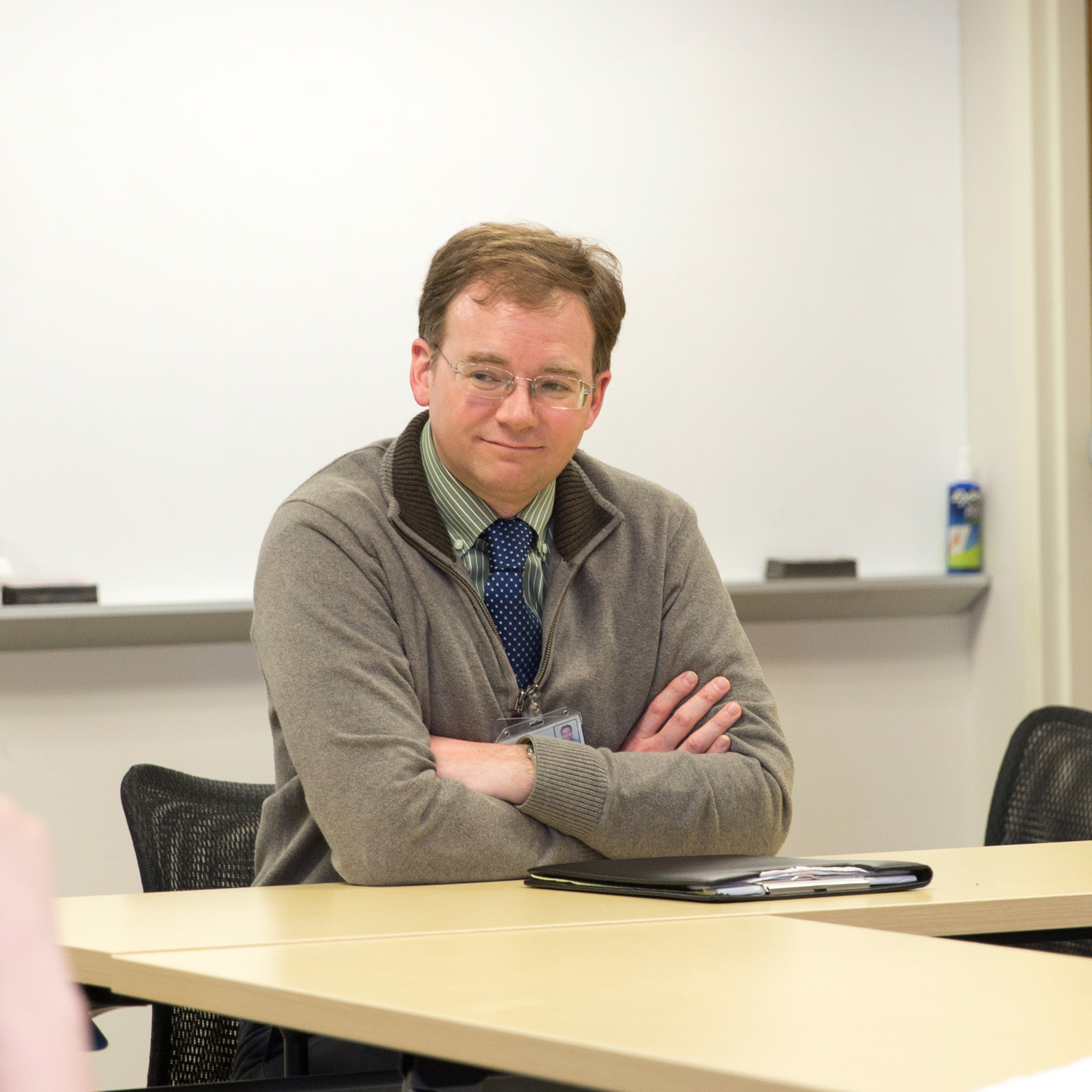|
|
 |
Didactics for All Psychiatry Residents
Grand Rounds
- Who: Residents and faculty
- Attendance: Required
Description: Distinguished visitors or departmental faculty members present interesting and challenging patients or discuss topics of special interest. Most grand rounds include a case presentation, typically with a live interview. Relevant literature, including the natural history and current treatment of the disorder, is presented, reviewed, and discussed.
Journal Club
- Who: Residents
- Attendance: Required
Description: In this twice-monthly seminar, a resident presents a current journal article for review and discussion. With a faculty member serving as facilitator, the methods and design of the study, as well as the results and conclusions are discussed. Journal club always begins with a “mini-lesson” by a faculty member on a selected topic in evidence-based medicine. In addition to helping residents remain well-informed on current research topics, the seminar encourages critical thinking about current literature.
Psychopharmacology
- Who: Residents
- Attendance: Required
Description: Faculty members and clinical psychopharmacologists provide up-to-date information on psychotropic medications and their use. These lectures review the neurochemistry, efficacy, side effects, contraindications, drug interactions, and long term effects of the medications we commonly prescribe. Additional topics include acute and maintenance treatment of the major disorders, considerations for pediatric and geriatric populations, treatment of refractory cases, management of drug-induced illnesses and side effects, and treatment of drug overdose and withdrawal.
Chair Rounds
- Who: Residents
- Attendance: Required
Description: Residents present a detailed case summary to a rotating faculty member. After the presentation, the patient is interviewed by the faculty member. Following the patient interview, the faculty member leads a discussion in which residents are encouraged to comment on an aspect of the case.
Didactics for First and Second Year Psychiatry Residents
Psychotherapy
- Attendance: Required
Description: The history of psychotherapy, interview methods, and types of psychotherapy are discussed by faculty members. Some topics include:
- Cognitive Behavioral Therapy
- Motivational Interviewing
- Dialectic Behavioral Therapy
- Family and Marriage therapy
- Acceptance and Commitment Therapy
- Psychodynamic Psychotherapy
Practical applications include the therapist-patient alliance, transference, countertransference, resistance, strategies for change, and termination. The purpose of this series is to provide residents with a solid foundation for their supervised psychotherapy experience in their third and fourth years.
Foundational Psychiatry Lectures
- Attendance: Required
Description: Faculty members lecture on the psychopathology of major psychiatric disorders, including schizophrenia, mood disorders, anxiety disorders, somatoform disorders, eating disorders, substance use, forensic psychiatry, and personality disorders. The series also provides an introduction to the mental status examination, psychiatric emergencies, psychological testing, commitment procedures, and utilization review.
Didactics for Third and Fourth Year Psychiatry Residents
Psychotherapy
- Attendance: Required for third year residents
Description: The history of psychotherapy, interview methods, and types of psychotherapy are discussed by faculty members. Some topics include:
- Cognitive Behavioral Therapy
- Motivational Interviewing
- Dialectic Behavioral Therapy
- Family and Marriage therapy
- Acceptance and Commitment Therapy
- Psychodynamic Psychotherapy
Practical applications include the therapist-patient alliance, transference, countertransference, resistance, strategies for change, and termination. The purpose of this series is to provide residents with a solid foundation for their supervised psychotherapy experience in their third and fourth years.
Foundational Psychiatry Lectures
- Attendance: Required
Description: Faculty members lecture on the psychopathology of major psychiatric disorders, including schizophrenia, mood disorders, anxiety disorders, somatoform disorders, eating disorders, substance use, forensic psychiatry, and personality disorders. The series also provides an introduction to the mental status examination, psychiatric emergencies, psychological testing, commitment procedures, and utilization review.
Other Didactics
Clinical Skills Exams
All psychiatry residents have biannual clinical skills exams with an assigned faculty member. This involves interviewing a patient unknown to the resident and then presenting the case to the faculty member, including all relevant history, discussing case formulation, differential diagnosis, and treatment plans.
Psychotherapy Supervision
Third and fourth year residents are required to meet regularly with their assigned psychotherapist (one hour per week) to discuss ongoing therapy patients and their treatment.
Ongoing departmental and residency program communication:
- Resident-only lunches
- Program Director lunches
- Clinical updates
- R1 Chief Medical Officer orientations
- Individual class leadership meetings with Drs. Nopoulos, Crocker, and Van Den Beldt
Structured opportunities for resident involvement and leadership:
- Diversity Interest Group Meetings
- Residency Policy Committee Meetings
- Resident Liaison Committee Meetings
- Resident Wellness Committee Meetings
Psychiatry Conferences
All residents are encouraged to attend annual psychiatry conferences that take place throughout the United States. These include, but are not limited to, conferences held by the American Psychiatric Association, Iowa Psychiatric Society, Academy of Consult-Liaison Psychiatry, American Academy of Child and Adolescent Psychiatry, American Academy of Psychiatry and the Law, American Association for Geriatric Psychiatry, and American Neuropsychiatric Association and conferences sponsored by the Substance Abuse and Mental Health Services Administration.
In addition, residents are encouraged to attend psychotherapy workshops including training events sponsored by the Iowa Psychotherapy Training Institute at the University of Iowa. These events have new topics annually and include training in interpersonal psychotherapy, motivational interviewing, and acceptance and commitment therapy.
Residents are given five excused educational days each year to attend educational events related to psychiatry, separate from their other paid time off, as well as a small academic fund to help defray the associated expenses.
Psychotherapy Supervision
Third and fourth year residents are required to meet regularly with their assigned psychotherapist (one hour per week) to discuss ongoing therapy patients and their treatment.
Second year residents are also given the option of beginning longitudinal psychotherapy cases with supervision for a half-day per week.
